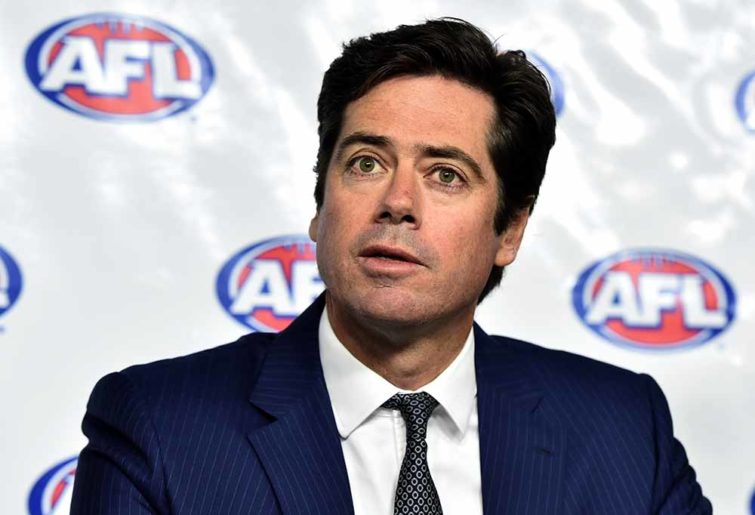'Players need to be given leniency': Brown's plea to the AFL on rough conduct decisions
Jonathan Brown has made a passionate plea to the AFL on On the Couch to give players leeway as they make split-second decisions, following…
Opinion
As we near a possible resumption to the interrupted AFL season, you know what I’d like to know?
I’d like to know the exact details behind the broadcasting rights.
I don’t care about money. I don’t care about the breakdown of who gets to screen what. I’d like to know the clauses stipulated in regards to an interrupted season.
Because those clauses will be in there.
The AFL, Foxtel and Channel 7 might not have foreseen a pandemic, but there are other reasons that a season might be interrupted.

(AAP Image/Julian Smith)
The most obvious is terrorism.
Sepetember 11 changed our perception of everyday safety. War had always been this thing that we sent soldiers off to fight in some foreign land. THe terrorist attacks of 2011 recontextualised frontline assaults in a way that we’d never anticipated.
There have been over 50 terrorist attacks around the world since 911. While some of them have been small and/or contained, we’ve all lived with the dread that there’s another big one being planned. The AFL obviously understand this because measures are implemented to check people entering games. We’re stopped and scanned.
Then there’s also the possibility of war. It’s not as unlikely as it might seem. There have been protracted battles since 9/11, and there’s always the risk of conflict escalating into something global.
During World War I Geelong, South Melbourne, Essendon and Melbourne didn’t field teams. The 1916 season comprised only four clubs: Carlton, Collingwood, Fitzroy and Richmond.
Geelong withdrew from the competition for 1942-43, although this is because the war disrupted rail service. Other clubs fielded depleted teams. Collingwood and Melbourne briefly considered merging.
This isn’t intended to be a digression and exploration of terrorism and war. They’re just examples introduced to suggest that, however unlikely, events beyond the AFL’s and the broadcasters’ control can disrupt a season.
And there would have to be contingencies in place. So what does the broadcast contract stipulate?
There’s no way the broadcasters are going to pay big money for no football or, as it stands now, one round of football.
And there’s no way the AFL would agree that they’d get money only if all 23 rounds and every final is played. That would mean if just one round were sacrificed – for whatever reason – they’d forfeit the big dollars they need to survive.
There has got to be some middle ground, which would be a simple equation, such as:
This is what contracts do. They try to protect all parties involved. They try to cater for extenuating circumstances. They try to provide contingencies.
And, simplest of all, each party tries to protect their best interests.
There’s no way there’s nothing in that contract about disruptions but a big murky hole that would lead to ongoing legal battles as to who’s entitled to what.
So I’d like to know, because if there’s something in that broadcast contract about X number of games constituting a season, I would then look at the AFL’s fanaticism to resume the season in a totally new light.